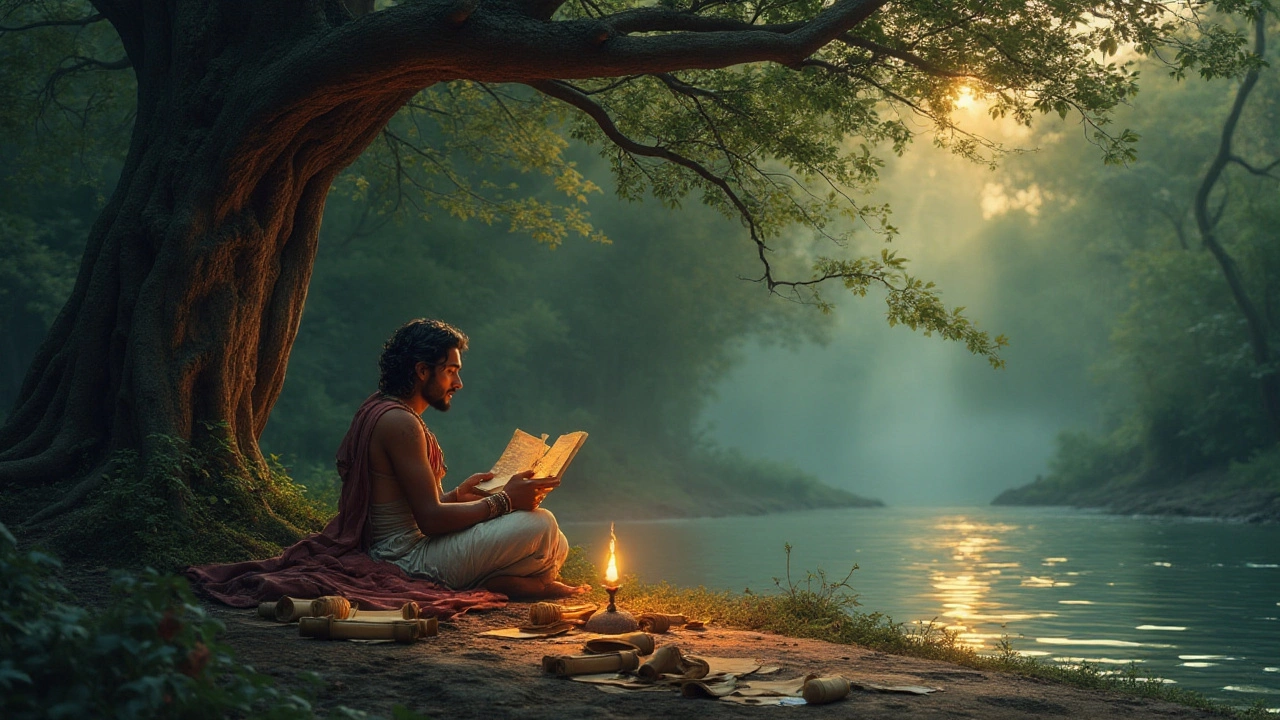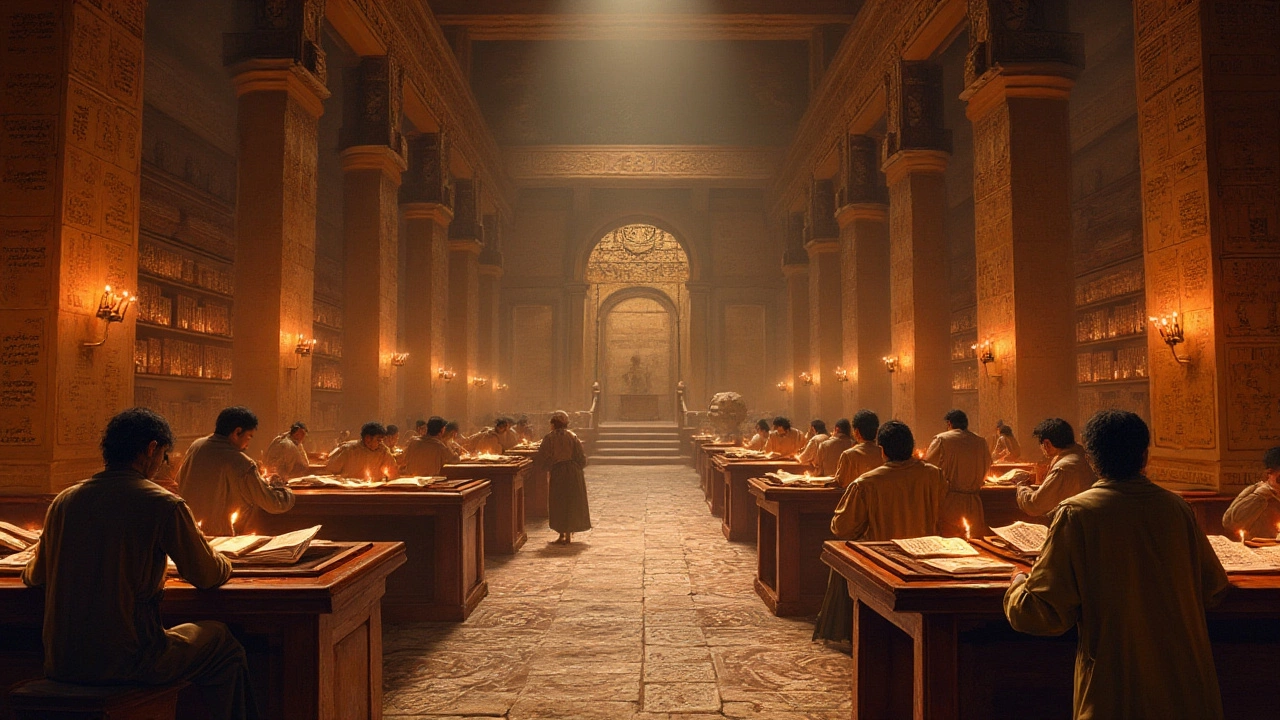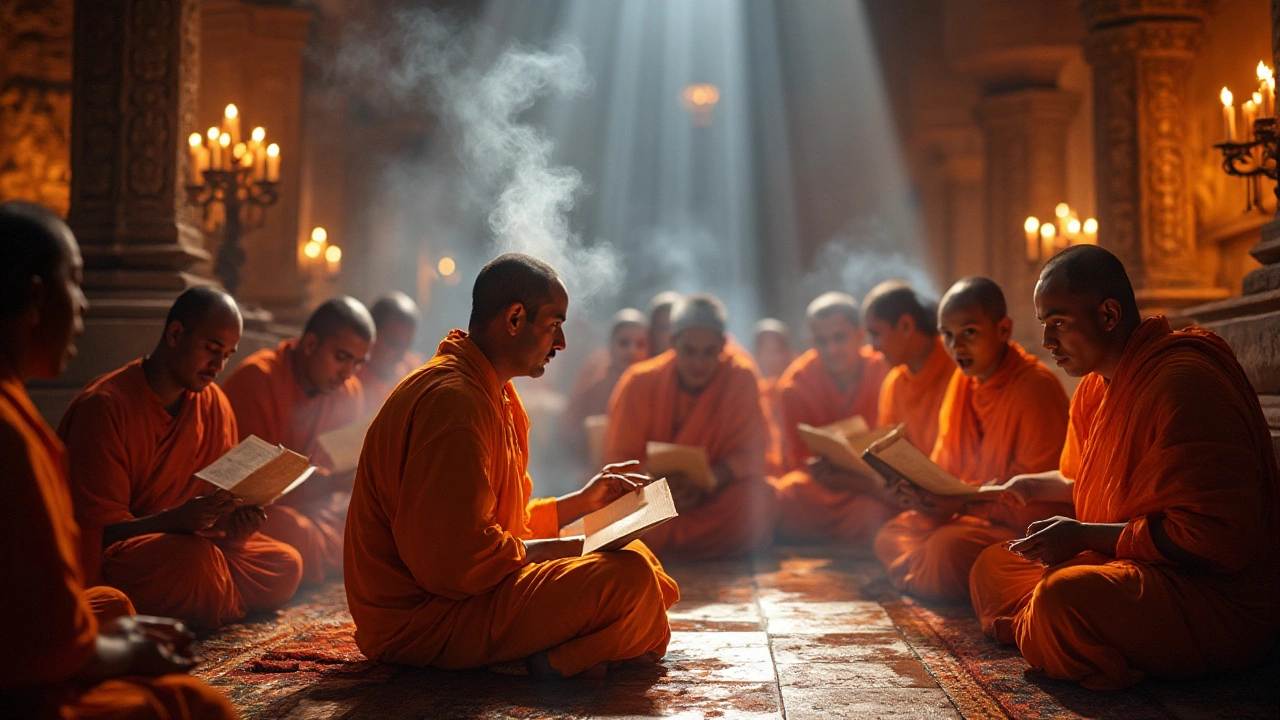Unraveling the World's Oldest Known Poem

The mysterious allure of poetry lies not only in its beauty but also in its ancient roots. Tracing back to the dawn of civilization, the oldest known poems offer glimpses into early human societies and their ways of life. These verses carry voices from the past, echoing the thoughts, beliefs, and aspirations of the earliest poets.
Among these timeless creations, the Epic of Gilgamesh, originating from Mesopotamia, is frequently acknowledged as one of the oldest complete works of poetry. While not of Indian origin, it has sparked interest in exploring poetry across different ancient civilizations, including India, where the early Vedic texts present profound poetic expressions interweaved with spiritual themes.
This exploration of the world's oldest poems not only highlights the artistic achievements of our ancestors but also underscores the universality and enduring power of poetry through ages. As we delve into these ancient verses, we uncover not just stories and myths, but the very fabric of human expression.
- Introduction to Ancient Poetry
- Reviewing the Epic of Gilgamesh
- Exploring Indian Contributions
- Historical Context and Impact
- Preservation and Influence Over Time
Introduction to Ancient Poetry
In the vast tapestry of human cultural history, poetry emerges as one of the earliest forms of artistic expression. The origins of poetry trace back to the time when mankind first began to articulate its thoughts, emotions, and myths in structured, rhythmic language. Poetic forms likely predate the invention of writing, thriving in oral traditions where skilled individuals, often acting as the community's memory, would recount epic tales of gods, heroes, and historical events. These poets, or bards, were revered vessels of oral knowledge, preserving the ethos and values of their people through captivating narrative styles.
As writing systems emerged, the oral traditions of poetry found a new means to immortalize their stories, transitioning from spoken word to clay, papyrus, and eventually paper. Some of the oldest known written poems come from the Sumerians, with tablets dating as far back as 2100 BCE. Perhaps the most well-known of these is the Epic of Gilgamesh, a Mesopotamian text that explores themes of heroism, friendship, and the search for immortality. This epic not only provides insights into ancient Sumerian society but also underscores the universal human themes that have transcended time.
Ancient Indian poetry, similarly, developed through the synthesis of oral traditions and religious hymns. The Vedas, for example, are a collection of hymns and other sacred writings composed in Sanskrit that serve as a cornerstone of Hindu philosophy and spirituality. These texts, believed to have been composed between 1500 and 500 BCE, blend intricate linguistic structures with profound spiritual and philosophical inquiry. This duality makes early Indian poetry particularly unique, intertwining artistic expression with theological reflection in a way that resonates through the millennia.
The significance of poetry lies in its ability to capture the nuances of the human experience. As the poet Percy Bysshe Shelley famously remarked, "Poetry is the record of the best and happiest moments of the happiest and best minds."
Through various civilizations, from the Egyptians to the Chinese, distinct poetic forms and styles emerged, evolving over time while maintaining the essential purpose of capturing the human condition in all its complexity. Whether it was through the elaborate metaphors of Greek poets during their classical period or the profound simplicity of early East Asian verse, the determination to encapsulate emotion, wisdom, and experience remains a constant thread. Today, these antiquarian poems continue to inspire and inform modern poetic forms, reflecting our unbroken connection to those distant voices of the past.
Reviewing the Epic of Gilgamesh
The Epic of Gilgamesh is not just a poem; it is a towering testament to the early dawn of literary civilization. Written in the Akkadian language, this epic originates from ancient Mesopotamia, specifically the region known today as Iraq. What makes Gilgamesh particularly enthralling is its composition around 2100 BCE, making it arguably the oldest surviving piece of literature. The epic follows the adventures of Gilgamesh, a part-divine king of Uruk, exploring themes of friendship, the pursuit of glory, and famously, the quest for immortality. Its narrative weaves a rich tapestry of myth and legend, illustrating the existential concerns that resonate with us to this day.
The story is etched onto clay tablets using the stylus of cuneiform script, an ancient wedge-shaped writing form. This method of recording provides a peek into the diligent artistry and commitment of the ancient scribes. Unearthed in the 19th century, the most complete version we have today is the twelve-tablet set found in the ruins of the great library of Assyrian King Ashurbanipal at Nineveh in present-day northern Iraq. One can't help but admire the audacity and imagination of these early literati, daring to memorialize their dreams and fears in hard clay, a full millennia before other notable works like the Vedas or the Egyptian Book of the Dead.
A tale woven with adventure, it begins with Gilgamesh’s reign, characterized by his tyrannical and oppressive manner. His subjects, overwhelmed by his cruelty, implore the gods for salvation. Enter Enkidu, a wild man created by the gods to counterbalance Gilgamesh’s power. The unexpected camaraderie between Gilgamesh and Enkidu forms the first cornerstone of the narrative. They embark on quests that challenge not only their strength but also their perception of human life and divine power. This friendship, so central to the story, invites readers to ponder the complexities and redemptive qualities of human relationships.
The struggles between divine beings and mortals culminate in Gilgamesh’s introspective journey following Enkidu's death. Reeling from the loss, Gilgamesh's reflections on mortality drive him to seek Utnapishtim, the only survivor of a great flood and the recipient of eternal life. Here, the poem poignantly tackles the ephemeral nature of life and the human condition, echoing through epochs.
The British Museum states, "The Epic of Gilgamesh is an enduring legend, influencing the storytelling of many subsequent cultures." Indeed, this sums up the profound impact this piece of work has had over centuries, transcending its Sumerian origins.
Within its lines, the epic offers more than just a story; it contemplates the complex relationship between the fear of death and the longing for immortality, questions that still challenge the human psyche today. Its resonance can be traced in diverse cultures, influencing works as modern as J.R.R. Tolkien's Middle-earth and Neil Gaiman's American Gods. Although often overshadowed by its contemporaries in India or Greece, Gilgamesh stands as a colossus of ancient lore. Exploring it, one does not simply read the first poem; one listens to the first echoes of humankind striving to understand its place in the cosmos.

Exploring Indian Contributions
India's poetic heritage is as vast as it is ancient, playing a crucial role in the realm of ancient poetry alongside the Epic of Gilgamesh. The earliest Indian poetry can be traced back to the Rigveda, an ancient Indian collection of Vedic Sanskrit hymns. Consisting of 1,028 hymns, this revered text is regarded as one of the oldest religious scriptures still in use. The Rigveda is a perfect epitome of early Indian poetry, with expressions articulated in ways that encapsulate philosophical musings, rituals, and historical narratives. These hymns are a blend of spirituality and pragmatism, revealing an array of poetic devices like metaphor, symbolism, and alliteration, signifying advanced poetic craftsmanship from ancient times.
The Mahabharata, another monumental work, asserts itself as one of the greatest epics known to mankind. Its sheer size makes it eight times longer than the Iliad and Odyssey combined, filled with rich characters, narratives, and profound philosophical debates. The poem reflects the moral and ethical dilemmas faced by kings and warriors and is interspersed with dialogues that explore dharma (duty/righteousness) in great depth. Ancient Indian poetry also finds a voice in the Ramayana, another eloquent epic attributed to the sage Valmiki. Comprising 24,000 verses, the Ramayana tells the story of Rama, mentioning ideals and values such as loyalty, courage, and the triumph of good over evil. These timeless epics have been recited and sung for centuries, retaining their significance within the tapestry of Indian culture.
The impressive legacy of Indian poetry extends to the classical Sanskrit poets of later centuries. Kalidasa, often heralded as the Shakespeare of India, created lyrical and dramatic works that include the well-known play 'Shakuntala' and the exquisite epic poem 'Meghaduta' or 'Cloud Messenger'. His evocative descriptions of nature and delicate portrayal of human emotions make his poetry undeniably captivating. The influence of ancient Indian poetry transcends borders, with ancient texts being translated into numerous languages while inspiring poets and thinkers worldwide. Indian poetry's intrinsic connection to spirituality allowed it to not only preserve but also contribute to the development of global literature.
It is a testament to the resilience and dynamism of the human spirit. From the resounding echoes of Vedic chants to Kalidasa's mellifluous verses, the oldest poems of India offer us not just a glimpse into the past but a profound appreciation of our shared humanity. These ancient verses, cherished and studied across generations, continue to enrich our understanding of the world and poetry's eternal allure.
Historical Context and Impact
Tracing the roots of poetry to its earliest forms reveals stories more enchanting than fiction, as these works were a reflection of the times they were born in. It's fascinating how amidst the bustling city-states of ancient Mesopotamia, the Epic of Gilgamesh emerged. This created ripples in the annals of time by sharing motifs of friendship, heroism, and the inexorable fate of mortality. Set in a world filled with gods and epic adventures, these verses opened windows to a civilization rich in stories and profound philosophical inquiries. They weren't just stories but a complex interplay of socio-political situations entwined with profound human emotions and existential ponderings.
India, too, brims with ancient poetry that rivals these Mesopotamian treasures. Early Vedic texts are among the most significant poetic artifacts, blending spirituality with the beauty of verse. The Rigveda, composed between 1500 to 1200 BCE, consists of hymns dedicated to the gods, forming a sacred canon for Vedic rituals. Unlike the Epic of Gilgamesh, the aim here extended beyond storytelling, serving a dual purpose of religious worship and philosophical introspection. As these poetic works spread orally across generations, they unified communities around shared beliefs and practices, shaping not only individual identity but societal cohesion as well.
The impact of ancient poetry can be seen in its enduring nature—despite the millennia, these words have not lost their power. Poetry allowed early societies to document their narratives, preserving them against the tide of time. It acted as a bridge between oral traditions and the written word. Its influence trickled down into modern literature and continues to inspire writers and poets. These early works laid the groundwork not only for art and storytelling but for developing a profound understanding of the human condition and our place in the universe.
The legacy of these poetic beginnings is far-reaching. Modern scholars and poets often find themselves returning to ancient verses for insight and inspiration. In the words of literary scholar T.S. Eliot,
“Poetry is not a turning loose of emotion, but an escape from emotion; it is not the expression of personality, but an escape from personality.”This speaks to how ancient poetry, while rooted in the emotive power of experiences, provided a conduit for transcending personal boundaries, seeking universal truths.
The tenacity with which these early poems have survived speaks volumes about their significance. The perseverance of texts like the Epic of Gilgamesh and ancient Indian poetry reflects a universal human need — the need to understand ourselves and to communicate that understanding in ways that transcend time and space. These ancient works are not just relics; they are vibrant pieces of our ongoing narrative, strings subtly tying the past to the present.

Preservation and Influence Over Time
Preserving the world's oldest poem has required remarkable dedication from scholars, historians, and archaeologists. The Epic of Gilgamesh, discovered through numerous clay tablets buried in the sands of Mesopotamia, faced the challenge of deciphering the cuneiform script, one of humanity's earliest forms of writing. The translation would not have been possible without the commitment to preserve and reconstruct these ancient texts over centuries. This painstaking process involved decoding each tablet, often piecing together fragmented texts found in different locations. As a result, the Epic of Gilgamesh has withstood the test of time, adapting continually through various civilizations, linguists, and cultures. Its story, centered on universal themes of friendship, mortality, and man’s quest for meaning, resonates across different ages alongside ancient Indian poetry.
The influence of these poems extends beyond their immediate regions of origin. Epic poetry like the Mahābhārata and the Ramayana have had a similar global impact, considered sacred among Indian poetry traditions. However, their narrative structures and thematic explorations can be seen echoed in literature worldwide. It's essential to acknowledge that these pieces often found new life when interacting with modern audiences through various translations and adaptations. Their tales became part of educational curriculums, inspiring generations of poets and writers. It is not uncommon to find clear parallels drawn between the earliest stories and more contemporary works.
Evidence of their longstanding influence can also be seen in other diverse art forms such as theatre, dance, and cinema—each providing a new lens to interpret these timeless narratives. For instance, dramatic interpretations often emphasize human emotions present in these early texts, allowing a more visceral connection with audiences. As modern technology provides new tools for storytelling, ancient poetry's reach only grows, cementing its place in humanity's cultural landscape. Dictating the everlasting significance, the energy surrounding these preserved words continues to inspire and shape artistic expression across the world. As novelist Neil Gaiman once said,
'Stories are alive. They move and change and leave their marks, but what is important is they remain.'Within these ancient verses lie the portraits of early civilizations, captured forever yet ever-evolving.